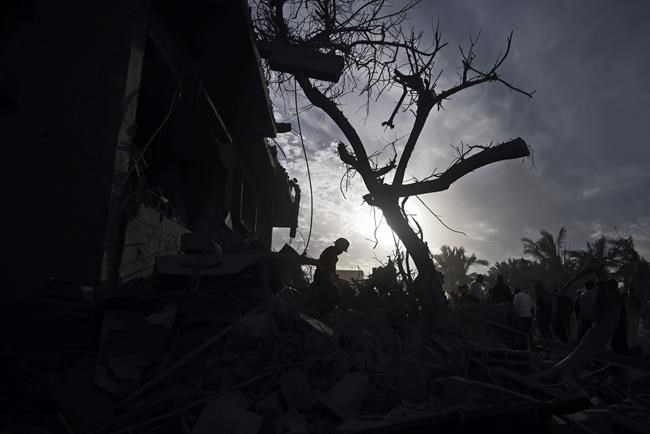MONTREAL ŌĆö With one of his sons in a Gaza hospital, Toronto resident Nahed El-Khalidy said the recently announced ceasefire between Israel and Hamas is good news, though it came too late to save his daughter's life.┬Ā
El-Khalidy said his daughter Caroline, 27, was killed Monday when an Israeli airstrike hit a building near her location in Gaza. The blast, which left his 17-year-old son Mahmoud seriously injured, came one day after the teenager was turned back at the Egyptian border as he tried with other family members to escape to sa╣·╝╩┤½├Į.
He said his son needs medical care that isn't currently available in Gaza amid shortages of medicine and electricity, and he wants the Canadian government to help.
"He needs surgery urgently, now," El-Khalidy said in an interview Wednesday. "He needs oxygen and there's no oxygen ŌĆ” he can't open his eyes, he can't move his hands."
The four-day truce announced Wednesday is expected to free dozens of Israeli hostages held by militants as well as Palestinians imprisoned in Israel. It would also bring a large influx of aid to the besieged territory. A Qatari foreign ministry spokesman said Thursday the ceasefire will start at 7 a.m. local time Friday, a day later than originally announced.
"It will be good," El-Khalidy said of the ceasefire, adding that it will make it easier for people to bring water and medicine to hospital patients like his son.
El-Khalidy, an accountant who worked as a university professor in Gaza before moving to sa╣·╝╩┤½├Į three years ago, said all his family members ŌĆö except for Mahmoud ŌĆö were on a list of people with Canadian ties allowed to cross into Egypt Sunday.
A Canadian permanent resident, El-Khalidy said he had contacted Global Affairs and was told that his son should go to the border anyway, and that Canadian officials would help him cross with his family.
However, El-Khalidy said the Egyptians refused to allow Mahmoud to cross and initially balked at letting any of the family in.
Caroline and her three children and one of El-Khalidy's other sons, Mohammed, and his children stayed behind with Mahmoud. He said Mohammed and several of the children were also injured in the blast.
Caroline's oldest child, a six-year-old girl, was the most seriously injured and is also in hospital, El-Khalidy said. He said he spoke with the girl yesterday by phone and she asked him why he hadn't yet brought her to sa╣·╝╩┤½├Į. "She's afraid, she's scared," he said.
He said he wasn't able to reach family members in Gaza Wednesday, and the last time he spoke with them, he was told the Israeli military had ordered everyone to leave the hospital where his son was being treated. "What will happen with my son and my grandchildren? It is very horrible," he said.
One of El-Khalidy's family members who made it out of Gaza, his daughter Nisreen, said in a text message exchange from Egypt that leaving behind family was difficult.
"It was heartbreaking, leaving when part of our family is still suffering the pain, the fear of getting killed any time or being starved to death," she wrote Thursday. "It got even worse when my brother Mahmoud couldn't join us even though he has been granted Canadian permanent residency, same as us."
She said Canadian officials weren't able to do anything to help him at the border, and he had no choice but to turn back.
El-Khalidy said his wife and six of his children who crossed into Egypt now have to come up with $17,000 ŌĆö money his family doesn't have ŌĆö for airfare to sa╣·╝╩┤½├Į.
He said the United States and Australia have done more to help family members of their residents to leave Gaza, and he wants sa╣·╝╩┤½├Į to do the same. "I need the Canadian government to bring my kids, my sons, my daughters here immediately," he said.
Global Affairs did not respond to a request for comment on Thursday.
This report by The Canadian Press was first published Nov. 23, 2023.┬Ā
ŌĆö With files from The Associated Press and Sidhartha Banerjee in Montreal.
Jacob Serebrin, The Canadian Press


